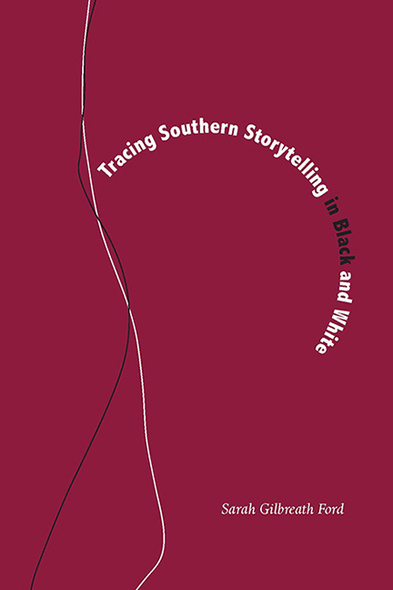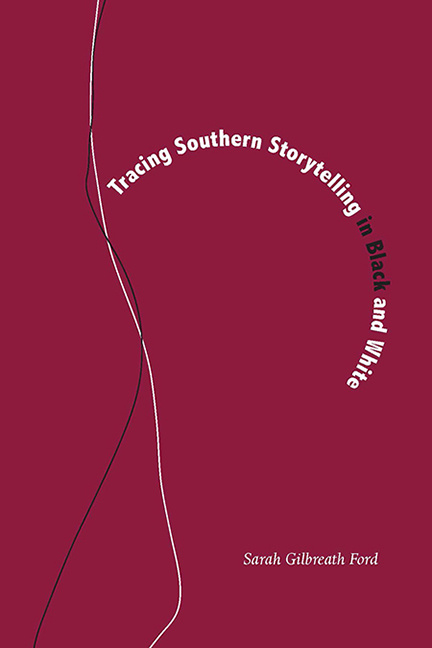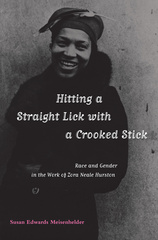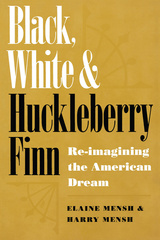Tracing Southern Storytelling in Black and White
University of Alabama Press
Explores how both black and white southern writers such as Joel Chandler Harris, Charles Chesnutt, Zora Neale Hurston, William Faulkner, Eudora Welty, Ralph Ellison, Ellen Douglas, and Ernest Gaines have employed oral storytelling in literature
Tracing Southern Storytelling in Black and White is a study of the historical use of oral storytelling by southern writers in written works. In each chapter, Sarah Gilbreath Ford pairs a white and an African American writer to highlight points of confluence in black and white southern oral traditions. She argues that the connections between white and African American southern writers run deeper than critics have yet explored, and she uses textual comparisons to examine the racial mixing of oral culture.
On porches, in kitchens, and on the pages of their work, black and white southerners exchanged not just stories but strategies for telling stories. As a boy, Joel Chandler Harris listened to the stories of African American slaves, and he devised a framework to turn the oral stories into written ones. Harris’s use of the frame structure influenced how Charles Chesnutt recorded oral stories, but it led Alice Walker to complain that her heritage had been stolen. Mark Twain listened to African American storytellers as a child. His use of oral dialects then impacts how Ralph Ellison and William Faulkner employ oral storytelling and how Toni Morrison later writes in response to Faulkner. The interactions are not linear, not a chain of influence, but a network of interactions, borrowings, and revisions.
Ford’s pairings lead to new readings that reveal how the writers employ similar strategies in their narratives, due in part to shared historical context. While Zora Neale Hurston and William Faulkner, for example, use oral storytelling in the 1930s to examine the fear of racial mixing, Ellen Douglas and Ernest Gaines use it in the 1970s to build bridges between the races. Exploring the cultural crossing that occurs in the use of oral storytelling, Ford offers a different view of this common strategy in southern narrative and a new perspective on how culture is shared.
Tracing Southern Storytelling in Black and White is a study of the historical use of oral storytelling by southern writers in written works. In each chapter, Sarah Gilbreath Ford pairs a white and an African American writer to highlight points of confluence in black and white southern oral traditions. She argues that the connections between white and African American southern writers run deeper than critics have yet explored, and she uses textual comparisons to examine the racial mixing of oral culture.
On porches, in kitchens, and on the pages of their work, black and white southerners exchanged not just stories but strategies for telling stories. As a boy, Joel Chandler Harris listened to the stories of African American slaves, and he devised a framework to turn the oral stories into written ones. Harris’s use of the frame structure influenced how Charles Chesnutt recorded oral stories, but it led Alice Walker to complain that her heritage had been stolen. Mark Twain listened to African American storytellers as a child. His use of oral dialects then impacts how Ralph Ellison and William Faulkner employ oral storytelling and how Toni Morrison later writes in response to Faulkner. The interactions are not linear, not a chain of influence, but a network of interactions, borrowings, and revisions.
Ford’s pairings lead to new readings that reveal how the writers employ similar strategies in their narratives, due in part to shared historical context. While Zora Neale Hurston and William Faulkner, for example, use oral storytelling in the 1930s to examine the fear of racial mixing, Ellen Douglas and Ernest Gaines use it in the 1970s to build bridges between the races. Exploring the cultural crossing that occurs in the use of oral storytelling, Ford offers a different view of this common strategy in southern narrative and a new perspective on how culture is shared.
Tracing Southern Storytelling in Black and White is a significant contribution to literary scholarship of the US South and an important resource for those interested in studies of the self, oral storytelling, and narrative influences in southern and African American literature.'
—South Central Review
‘Tracing Southern Storytelling in Black and White breaks down barriers of literary approaches to southern writers and southern writing in terms of color, gender, and storytelling techniques. Ford urges scholars and teachers to look again at what they have assumed to be solidified, to shake loose the dirt of possibility, and to allow some connections to spring forth that have otherwise been barred by artificial and limited approaches to southern writing and race. Ford puts black and white writers and their works in conversation with each other in ways that showcase blending without dissolution. The fact that the author explores these ticklish issues in an effort to gauge how features of oral storytelling saturate the narratives of African American and white southern writers who may not consciously be aware of how black, white, and blended traditions influence their creativity is the true merit of this volume.’
—Trudier Harris, author of Summer Snow: Reflections from a Black Daughter of the South and The Scary Mason-Dixon Line: African American Writers and the South
Sarah Ford’s fresh and lively manuscript makes a real contribution to our understanding of southern storytelling, particularly in its insistence on interracial narrative hybridity. By offering intriguing combinations of black and white writers, but taking a different approach toward storytelling in each chapter, Ford provides some strikingly original readings and very useful cultural configurations. She demonstrates a well-modulated and thoughtful approach to issues of gender, voice, and the construction of identity on both sides of the color line, and more importantly, across it too.’
—John Lowe, author of Jump at the Sun: Zora Neale Hurston’s Cosmic Comedy
Sarah Gilbreath Ford is an associate professor at Baylor University where she directs the undergraduate program in English and teaches early American, African American, and southern literature. She has published on Eudora Welty, Zora Neale Hurston, Sarah Pogson, and Ebenezer Cook.








